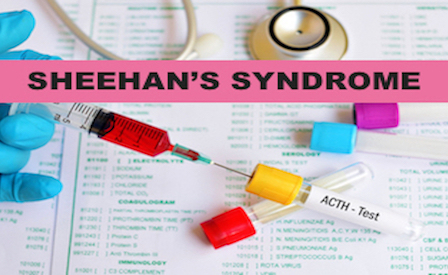
WHAT IS SHEEHAN SYNDROME?
WHAT IS SHEEHAN SYNDROME?
The rare disease Sheehan’s Syndrome is a disease that affects the function of the pituitary gland and is caused by severe blood loss during or after childbirth.
The loss of blood to the pituitary gland may destroy hormone producing tissue.
When necrosis of the pituitary gland occurs the pituitary may lose some or all of its function.
The disease, Sheehan’s Syndrome is named after Dr. Harold Leeming Sheehan.
In 1937 Dr. Sheehan’s complete concept of the syndrome was reviewed. He emphasized that during pregnancy the pituitary becomes enlarged but its blood supply becomes diminished.
If a woman hemorrhages during childbirth it causes a severe drop in blood pressure (hypotension) and may damage the pituitary.
HOW TO UNDERSTAND SHEEHAN SYNDROME
A simple was to understand this concept is the loss of blood (hemorrhaging) to the pituitary creates an infarct (stroke) in the pituitary gland.
The infarct may cause part or all of the pituitary gland to lose function.
The damage of a pituitary gland infarct can occur immediately after childbirth or decline gradually.
The damage to the pituitary gland can affect the pituitary gland’s ability to signal other gland to increase or decrease production of hormones.
These hormones released from the pituitary gland control stress, muscle mass, urinary output, metabolism, fertility, wound healing and many other vital processes.
A lack of any of these hormones can cause health problems throughout your body.
The signs and symptoms of pituitary deficiency may develop so gradually over time and the onset of Sheehan Syndrome escapes being noticed.
PITUITARY GLAND HORMONES:
- Adrenocorticotropic Hormone (ACTH)
- Growth Hormone
- Antidiuretic Hormone (ADH)
- Oxytocin Prolactin
- Luteinizing Hormone (LH)
- Follicle-Stimulating Hormone (FSH)
- Thyroid-Stimulating Hormone (TSH)
SHEEHAN SYNDROME SYMPTOMS
- Difficulty breastfeeding ( lack of breast milk) Irregular heartbeat (May feel like a racy heartbeat at times.)
- No menstrual periods (amenorrhea) or infrequent menstruation (oligomenorrhea)
- The loss of pubic or underarm hair Slow mental function (forgetfulness and brain fog)
- Weight gain even when dieting Difficulty staying warm (this is a result of an underactive thyroid)
- Low blood pressure (May feel light headed and dizzy)
- Fatigue (So exhausted you can barely move out of bed)
- Loss of interest in sexual activity
Click on the following link to find a Sheehan's Syndrome Support Group.
You can find HypoGal's experiences and shortcuts to living with a chronic illness at HypoGalBlog.
Please, Like, HypoGal on Facebook.
